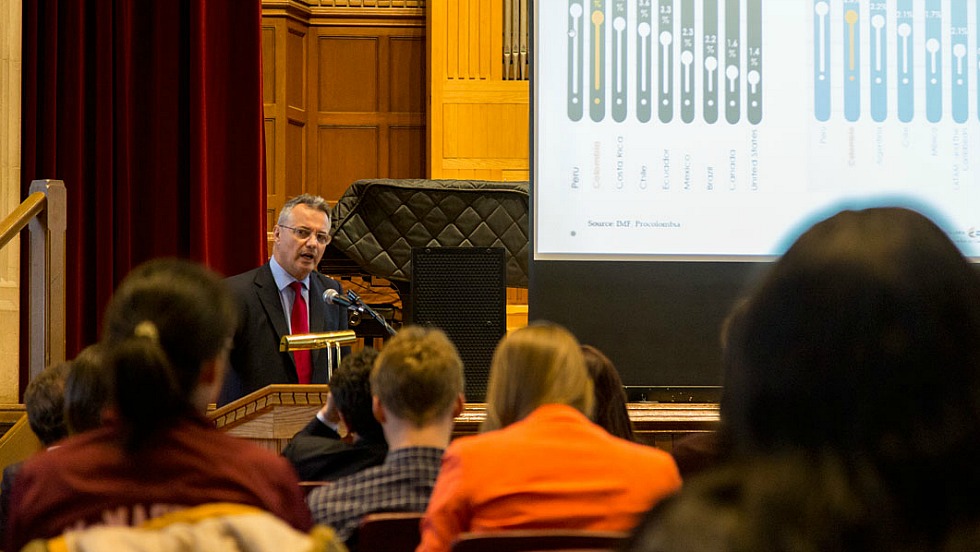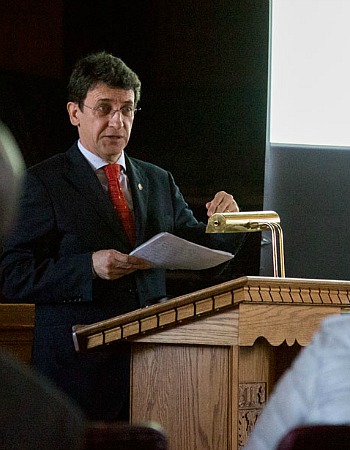Conference explores what Canada can learn from the Colombian peace process

Nicolas Lloreda, Ambassador of Colombia to Canada (pictured) and Justice Danilo Rojas, former Chief Justice of Colombia’s highest court, were recently on campus for a conference aimed at discussing the achievements and challenges of the Colombian peace process.
BY Erica Balch
May 11, 2017
After half a century of violent conflict, Colombia is in the midst of implementing an historic peace agreement aimed at achieving truth, justice and reconciliation.
What have been the successes and challenges of this process? And what are the lessons for Canada?
Nicolas Lloreda, Ambassador of Colombia to Canada and Justice Danilo Rojas, former Chief Justice of Colombia’s highest court recently took part in a public event co-sponsored by Peter Mascher, McMaster’s Associate Vice-President, International, that explored these questions and more.

The event was part of The Colombian Peace Process with FARC: Achievements, Failures and Challenges, a two-day conference hosted by Nancy Doubleday, McMaster’s HOPE Chair for Peace and Health, in cooperation with Bertrand Russell Research Centre.
“For a long time, people in Colombia didn’t think peace was a possibility,” says Lloreda of the Colombian peace treaty which was signed in 2016 after four years of negotiations between the Colombian government and Revolutionary Armed Forces of Colombia (FARC), the country’s largest guerrilla group.
Lloreda and Rojas spoke about a number of measures now being implemented as a result of the peace process including land reform, the transformation of rural areas, disarmament, and the development of the Special Jurisdiction for Peace, a judicial process that provides reduced sentences or pardons to those who acknowledge the full truth of their participation in the conflict, and aims to provide victims with reparations and guarantees of non-repetition.
“There are still a lot of problems, but if you look at where Colombia is now compared to where we were 10 or 15 years ago, nobody can deny the significant changes for the better that are taking place,” says Lloreda.
The conference brought together a number of experts from Colombia, Canada and the United States including individuals who took part in the peace negotiations, as well as experts in peace studies, transitional justice, human rights, Colombian criminal law and compensation systems, political philosophy and political science.
Doubleday, also a professor in the Department of Philosophy, says the conference provided a valuable opportunity for Colombian and Canadian experts to exchange knowledge and share each country’s unique experiences with truth and reconciliation.
“Certainly, in Canada we have an experience that’s quite different from Colombia in many ways,” she says. “But nonetheless, we have a common concern and we can learn from each other. In Colombia, there is a process, there is social innovation which will bring economic, social, and peace dividends, and a societal will to move on and try to deal with the past. Their remedies are interesting and very relevant to addressing the needs in this country as well.”
Doubleday says the conference helped build connections that she hopes will lead to future academic and research partnerships with Colombian universities and public agencies concerned with peace, justice, human rights, law, and conflict.
“We would like to develop collaborative academic programming and exchanges,” she says. “This transference of social learning would be a wonderful opportunity for our students.”
The Colombian Peace Process with FARC: Achievements, Failures and Challenges is the inaugural conference under the theme, “Global Perspectives on Peace.”
Discussions were moderated by Doubleday, Jorge Fabra-Zamora, a PhD candidate in legal philosophy, and co-convener, Andrés Molina-Ochoa from South Texas College.

